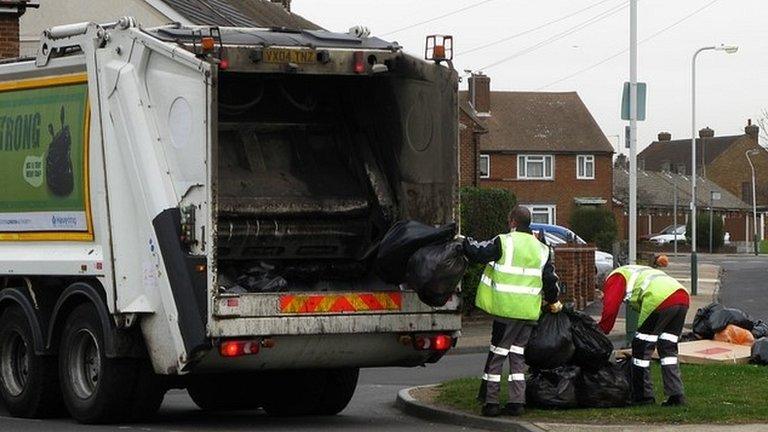Council tax to rise by up to 5% next year
- Published

Local authorities in England will be permitted to increase council tax by up to 5% next year.
They will be able to put 2% on bills, plus another 3% if they provide adult social care, the government announced.
Communities Secretary Robert Jenrick said the money raised - plus extra from central government - would mean a "real-terms" funding rise.
But Labour warned of a "vast" cash shortfall, resulting in job losses, service cuts and building sell-offs.
Mr Jenrick told the House of Commons that councils had so far spent £4bn of the £7.2bn made available by central government for their response to coronavirus.
Council tax increases will kick in from April - the start of the 2021/22 financial year.
Mr Jenrick said authorities were "not under any obligation to increase" bills.
He added that councils would "have the resources they need" to serve communities and "deliver first-class public services".

Nottingham: Snapshot of one city in financial trouble

Nottingham's Wollaton Hall is lit up for Christmas
By BBC East Midlands political editor Tony Roe
Figures from The Institute for Fiscal Studies show councils received 77% less in real central government grants per person in 2019-20 than a decade earlier. There are also complaints that some parts of the country aren't treated fairly.
The councillor in charge of Nottingham's finances, Sam Webster, sent the chancellor a Valentine's Day letter this year pointing out that since 2011 Nottingham has lost £564 per household, while Surrey has only lost £44.
But today the Labour City Council received a Christmas letter Robert Jenrick, after a "rapid review" into its finances revealed "appalling financial and management issues".
The review followed the collapse of the council's not-for-profit company Robin Hood Energy which is projected to have lost the local authority £38m.
It found the council started to lose control of its budget four years ago and criticises its involvement in too many of its own commercial companies.
It's left Nottingham with a "very significant" gap in its budget and depleted reserves.
There have been reports Nottingham City Council won't be able to set a balanced budget next year so is heading for bankruptcy.
Councillor Webster says they have significant financial challenges to deal with but isn't on the brink of bankruptcy.
The government has appointed a panel of experts to help the council improve and wants a recovery plan in place by the end of next month.

Mr Jenrick promised an extra £2.2bn for critical services, including adult and children's social care.
On average, councils would "see a 4.5% cash terms increase in core spending power, which is also an increase in real terms", he said,
If they want to raise bills by more than the government stipulates, local authorities must hold - and win - a referendum in their area.
For Labour, shadow communities secretary Steve Reed said it was "shocking" of the government to "plan to force councils to hike up council tax while the country still faces an unprecedented health crisis and the deepest recession for 300 years".
He called council tax "regressive", as it benefited wealthier areas more, saying: "A 5% increase in Surrey raises £38m while a 5% increase in Blackburn with Darwen raises just £2.8m."